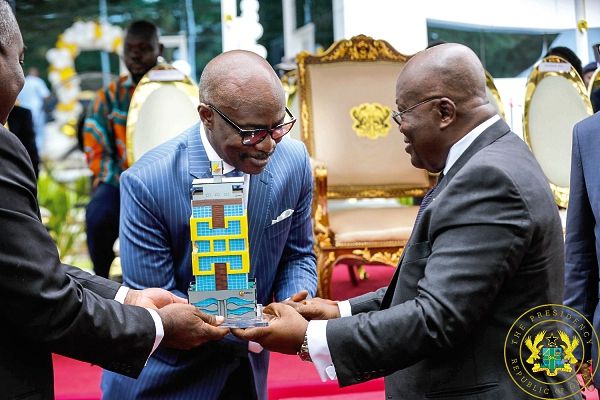
Financial sector reforms yielding positive results — Prez Akufo-Addo
President Nana Addo Dankwa Akufo-Addo yesterday inaugurated the new 12-storey eco-friendly headquarters building of the Cal Bank, a wholly Ghanaian owned bank, in Accra.
The facility depends mainly on renewable solar power generated in-house, complemented by the national grid, while the water system for the building is from harvested rain and underground water.
In an address at the ceremony, President Akufo-Addo stated that enough evidence abound that the recent financial sector reforms were yielding positive results.
He said as of the end of the first quarter of the year, total assets, deposits, loans and advances in the banking industry all saw positive growth, while the banks were well-capitalised, profitable, liquid and stable, with strong prospects for increased financial intermediation.
The President quoted the 2019 Banking Sector Report by the Bank of Ghana (BoG), which said that “an assessment of the banking sector’s performance during the first two months of 2019 showed a well-capitalised, profitable, liquid and stable sector, with strong prospects for increased financial intermediation.”
He said it was evident that the measures saved the banking industry from the dire situation characterised by instances of under-capitalised banks, multitudes of non-performing loans, pursuit of bad business models, poor governance practices and a non-existent central bank regulation.
He reiterated the fact that the measures saved 1.5 million depositors and businesses and minimised job losses.
Support
President Akufo-Addo noted that in Ghana’s quest for accelerated progress and development, the private sector and the people must be the main driving forces, with banks playing a critical role.
“When banks do not become mere profit-making enterprises but see themselves as active partners with the government in building a healthy, productive and robust economy, then the country will be making significant progress,” he added.
He explained that it was for that reason that the government continued to place a lot of emphasis on reforming the banking sector by taking the necessary measures to safeguard the stability and prospects of the economy.
Steps
The President said the government would continue to work to build a sustainable financial sector, with Ghanaian banks leading the charge by working with financial institutions and regulatory bodies to promote digital finance and mobile money usage to help formalise the economy.
President Akufo-Addo disclosed that already mobile money penetration in the country was the second highest in Africa and that with reforms in the payment system, it was anticipated that Ghana would have a strong competitive urge in the region for financial innovation and access to credit.
He explained that the government was also working hard to reduce interest rates and that the efforts had so far yielded some credit and encouraged domestic champions to grow and take positions in the key sectors of the economy.
He said the success of banks such as Cal Bank fortified his belief that with hard work, ingenuity, innovation and creativity, the vision of a Ghana Beyond Aid would be attained.
SDGs
President Akufo-Addo, who is also the co-Chair of the UN Secretary General’s Group of Eminent Advocates on Sustainable Development Goals (SDGs), commended the bank for resorting to the use of clean, affordable and renewable energy from its 500-kilowatt solar-powered energy for the 12-storey building.
He said as the African Union Gender Champion, he was glad to hear that there were more women than men in management positions, a move that was in consonance with Goal Number 5 of the SDGs.
Central bank
The Governor of the Bank of Ghana (BoG), Dr Ernest Addison, in his remarks, stated that the capital adequacy ratio of the banks that deteriorated prior to the banking sector reforms had significantly improved to above 20 per cent in March 2019.
He said the banking sector remained profitable, with the first quarter of 2019 recording after-tax income of GH¢825.9 million, showing an annual growth of 37 per cent, while liquidity levels in universal banks at the end of December 2018 through to the first quarter of 2019 was among the highest recorded in the past 12 years.
Dr Addison explained that the banking system was generally resilient to banking risks and that results from exchange rate and interest rate stress test revealed that unanticipated shocks from interest and exchange rates would not significantly affect the solvency condition of the system.
“One can conclude that the overall resilience of the banking industry has improved significantly.
These positive developments should help improve the efficiency of the industry, which should ultimately result in declining interest rates,” he stated.
Cal Bank
The Managing Director of the Cal Bank, Mr Frank Adu Jnr, for his part, told the gathering about the new building, which he said consisted of a main office tower and a six-storey multi-purpose staff parking and an open car park that could accommodate over 500 cars.
He said the primary source of power for the building was solar, with an installed capacity of 500 kilowatts, complemented by the national grid, while the water system for the building was from harvested rain and underground water.
He said the structure had a gymnasium, a running track of 180 metres long for the use of staff, a canteen, as well as a 400-seater theatre.
He also explained that more than 80 per cent of trees were preserved during the construction.
